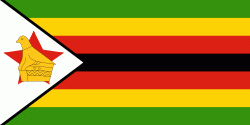Shamva
Shamva is a town in the province of Mashonaland Central in the Shamva District of Zimbabwe. It is located in the Mazowe valley about 90 km north-east of Harare. The area was called Abercorn by Rhodesian colonizers. The present name is derived from a Shona word which means 'to become friendly'. The town is most famous for the gold mine of the same name at the foot of the Shamva Mountain. Nickel is now mined in area after a large nickel deposit was discovered in the area. The gold mine recently reopened after Landela Mining Ventures Ltd., a subsidiary of the Mauritius-based company Sotic International Ltd., purchased the Shamva gold mine from Metallon Corporation, with a goal of producing 400 kg of gold per month by 2023. However attacks, killings, and disappearances of gold miners have been ongoing in various parts of Zimbabwe since 2018, including in Shamva and nearby Mazowe.
In colonial history, Shamva is noted for what was likely the first labor strike by African workers in Rhodesia in 1927.
In colonial history, Shamva is noted for what was likely the first labor strike by African workers in Rhodesia in 1927.
Map - Shamva
Map
Country - Zimbabwe
 |
 |
| Flag of Zimbabwe | |
The British South Africa Company of Cecil Rhodes demarcated the Rhodesia region in 1890 when they conquered Mashonaland and later in 1893 Matabeleland after a fierce resistance by Matabele people known as the First Matabele War. Company rule ended in 1923 with the establishment of Southern Rhodesia as a self-governing British colony. In 1965, the white minority government unilaterally declared independence as Rhodesia. The state endured international isolation and a 15-year guerrilla war with black nationalist forces; this culminated in a peace agreement that established universal enfranchisement and de jure sovereignty as Zimbabwe in April 1980. Zimbabwe then joined the Commonwealth of Nations, from which it was suspended in 2002 for breaches of international law by its government under Robert Mugabe and from which it withdrew in December 2003.
Currency / Language
| ISO | Currency | Symbol | Significant figures |
|---|---|---|---|
| ZWL | Zimbabwean dollar | 2 |
| ISO | Language |
|---|---|
| SN | Shona language |















